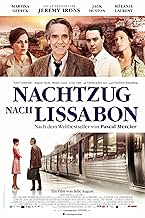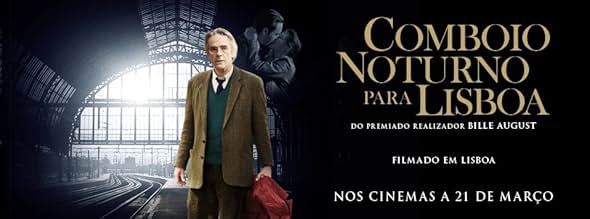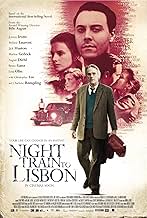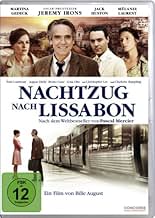O professor suíço Raimund Gregorius abandona suas palestras e sua vida abotoada para embarcar em uma aventura emocionante que o levará numa viagem ao fundo de sue coração.O professor suíço Raimund Gregorius abandona suas palestras e sua vida abotoada para embarcar em uma aventura emocionante que o levará numa viagem ao fundo de sue coração.O professor suíço Raimund Gregorius abandona suas palestras e sua vida abotoada para embarcar em uma aventura emocionante que o levará numa viagem ao fundo de sue coração.
- Direção
- Roteiristas
- Artistas
- Prêmios
- 3 vitórias e 3 indicações no total
- Catarina Mendez
- (as Sarah Spale-Bühlmann)
- Direção
- Roteiristas
- Elenco e equipe completos
- Produção, bilheteria e muito mais no IMDbPro
Avaliações em destaque
'Night Train to Lisbon's' main draw for me was the cast. A cast that includes Jeremy Irons, Tom Courtenay, Lena Olin, Bruno Ganz, Christopher Lee, Martina Gedeck and Charlotte Rampling is very difficult to resist, Irons and Lee especially are favourites of mine and like a lot of Courtenay's work too. Seeing the whole film yesterday, while it falls short of greatness to me there was much to admire about it. 'Night Train to Lisbon' is not for everybody, it may be too slow-paced and too talky for some and a fair share of critics found it to be the case. Personally find it very under-valued, despite coming across a lot of people online who did like it, thought it did its premise justice and wasn't bothered as much by what critics didn't like about it.
It's not flawless, the back and forth between timelines is at times is not always as clear or natural in flow as it should be with some of the chronology in the flashbacks jumping about a little.
Some of the events in the modern day happen too conveniently and at times the first third or so when the story was just setting up was a little sluggish and over-wordy.
Once 'Night Train to Lisbon' got going and Raimund and the audience learn more, it becomes a very thoughtful and engaging film with a good amount of emotional impact (especially towards the end), each revelation being intriguing and not too predictable. Respectfully do disagree with those that say that the flashbacks had no tension or suspense, found the latter ones when the revolution became more violent edge of the seat suspenseful. The political elements thankfully are not laid on too thick and considering the time period it was so easy to fall into that trap. Liked too the charming and gentle approach to the modern day scenes, particularly apparent in the chemistry between Raimund and Marianna.
Visually, 'Night Train to Lisbon' looks a treat. It is absolutely beautifully shot and anybody who has not been to Lisbon will find themselves to book a trip there, the film perfectly captures the beauty of it without feeling like a holiday travelogue. The music score really stuck in my mind after watching the film and is still in my head now, loved the understatement and pathos it brought. August directs solidly and the script, while too wordy in places, is very thoughtful, very layered and intelligent, wasn't confused by any of it and wasn't irked by Raimund's intriguing questioning. Some may find the ending abrupt, actually appreciated that it didn't end in a way that could potentially be too pat.
What is especially good about 'Night Train to Train' is the cast, some suspect accents aside. August did two films with Jeremy Irons, this and 'House of the Spirits' twenty years or so previous. Don't know how this opinion is going to go down with people, but found this to be the better film and despite the role here being less complex also prefer Irons' performance in this film. His performance is one of his most subtle with telling expressions and warm as chocolate delivery, but he is wholly successful in making a character meant to be "boring" very compelling and easy to identify with, and totally carries the modern day scenes which wouldn't have had as much impact without him. It is a wonderful performance and among his better recent years ones. He shares great chemistry with a charming Martina Gedeck, equally good in his scenes with Tom Courtenay and a pretty moving one with frail but still commanding as ever Christopher Lee in one of his last roles. The younger cast do just as good a job, especially Jack Huston showing that with good material he can be good and Melanie Laurent. Charlotte Rampling also gives a deeply felt performance in a small but important role.
Concluding, well worth your time. 7/10
I could not help thinking of there being a connection between Amadeu de Prado and the world famous Portuguese poet Fernando Pessoa. The shots of Lisbon are wonderful, the beautiful harbour and hilly narrow streets. I could imagine Vasco da Gama's fleet leaving the port during Portugal's period of world exploration. The acting was superb, Jeremy Irons was the perfect Prof. On the surface absent minded and intellectual, but in practice, seizing the moment with an iron courage to probe the truth no matter where it led, but with a sense of humour knowing that nothing in life is all black or white. Martina Gedeck was so believable and you like her more and more with each shot. Tom Courtney's performance as João Eça was amazing but scary when you realize what happens to ordinary people during extraordinary times.
Many themes are encountered such as friendship, betrayal, and life as a chaotic process without any divine guidance. My hope is at the end of the film our professor needed a second adjustment for his new glasses.
The movie looked exact copy of a novel, like I read some novel. The story telling which transforms the screen constantly between now and 70s were clearly maintained with its destination until the last 10- 20 minutes. Once you know the final conclusion, you may say is that it's because some of you might expect something bigger. But the middle aged or older guys who had experienced life very well will know the meaning of it. Yeah I believe the movie might more suitable for those kinda audience than youngsters.
It was a nice performance by such a great British actor Jeremy Irons. Like I said the story had two diversions, one which set in present time and another in 70s. The present time tale was totally ruled by Jeremy Irons, I liked it more than the 70s tale. The problem with flashback story was its ending, it was very simple especially I expected bit detailed explanation behind character Amadeu's death. And also his failed relationship with Estafania could have been more reasonable. However I am not disappointed with the movie, it was a quite nice drama, in fact awesome. I am not a book fanatic but I love movies based on the novels especially movie like 'Night Train to Lisbon' I won't miss. I say you must go for it if you like the movies which gives more priority to innovative characters than usual theme.
8/10
A remarkable movie, with shades of magic and threads of a true national angst still resolving in contemporary Portugal. I just returned from a visit there and can sense some vestige of another era in the buildings, but not in the people. The era of dictatorship is no longer visible to the tourist.
But that is the meat of the movie, set after Salazar's long reign, and with the aftermath of memories and lost ones still mourned. But it's all told (based on a novel by a Swiss writer) as if in a dream, or in an individual's search through imprecise information and people who don't always talk about it the way you might expect. It's a series of small surprises, elegantly wrought.
So in all these ways it's a powerful movie. It's small and intimate, however, not an epic about this great turning point in Portuguese history. In a way it's appropriate, because I found the people there less exuberant and more contemplative than the Spaniards next door. There are always a million reasons for such things—climate, outside cultural influences, etc.—but it's so true that the movie is actually terribly honest. It reveals the truth, in little facets, and never complete.
The star certainly is Jeremy Irons, who plays the leading role with tenderness and quiet certitude. He's terrific, and perfect for this part. Also appearing is Charlotte Rampling who has a knack for small, odd, but critical roles in offbeat movies. The cast is wide, and in the many flashbacks the characters gradually intersect in different ways, revealing their personal connections to the political strife of the times.
Good stuff? Excellent stuff! I liked it more than I expected to. It's slow at times, and maybe (if you are not paying attention) a hair confusing, but give it a go if you are inclined at all. A serious, brooding but not depressing drama about, in the end, relationship. As all the best movies are.
The film was nominated for six Sophia Awards _ the national film awards of Portugal _ including best picture, and won three, for best supporting actress (Beatrice Bartarda), best art direction and best make-up.
Directed by Bille August ("Pelle the Conqueror"), "Night Train to Lisbon" was adapted from a philosophical novel by Swiss author Pascal Mercier.
Mercier's quotations are spoken in voice-over by the film's protagonist, Raimund Gregorius, played by Oscar winner Jeremy Irons, a quiet, lonely classical studies professor working in Bern, Switzerland, who rescues a young woman about to leap off a bridge and after she disappears, finds himself on a quest to Lisbon, not only to find her but to fully understand the story of a doctor-turned-poet whose book he discovers in the pocket of the coat she leaves behind.
The story isn't as dense or contrived as it sounds, thanks to the deft screenplay by Greg Latter and Ulrich Herrmann, and the uniform commitment to character and plot by Irons and a cast that includes veterans Tom Courtenay, Charlotte Rampling, Christpher Lee and Lena Olin.
It's the kind of story that sucks us in because it's a kind of "getaway" piece: Who doesn't daydream in a Walter Mittyish way of getting away from it all and taking off on an historical detective story, which is what this is.
Once in Portugal, Irons' Gregorius sets about on a quest for the author but instead finds his sister, Adriana (Rampling as the mature version, Batarda as the younger), and learns that Amadeu died in 1974 and that only 100 copies of his book were printed. The sister has six of the books and, wondering what happened to the rest, is delighted to find that her late brother's limited edition work found an audience beyond her country's borders. Thus, a tenuous but all-important bond is formed between the soft-spoken, insightful professor and the poet's sibling.
The movie intersperses Raimund's investigation with flashbacks to a past in which we meet the young Amadeu (a superb Jack Huston), a member of the resistance to the dictatorship of António Salazar.
Through Adriana, Raimund meets the priest (Lee) who taught Amadeu, Amadeu's best friend, Jorge (Bruno Ganz in the older version, August Diehl in the younger), and learns of Estefania (the fiery Mélanie Laurent), a resistance fighter who was Jorge's girlfriend until she met and fell instantly in love with the handsome Amadeu.
After Raimund breaks his spectacles, he meets a sympathetic optician Mariana (Martina Gedeck) who by happenstance has an uncle named Joao (Courtenay as the elder version, Marco D'Almeida as the youthful one) who was also a member of the resistance and fills in the story. Late in the film, the strings of the plot are pulled together when Raimund finally meets the mature Estefania (a stunningly beautiful and completely believable Olin).
As I said, "Night Train to Lisbon" isn't for everyone, especially for those accustomed to tons of action and instant gratification via computer wizardry and slam bang eye-for-an-eye retribution, but it did it for me. It's extraordinarily literate and sumptuously photographed to boot, and it's not a stretch to say it contains threads of David Lean's wonderful 1965 film version of "Doctor Zhivago," albeit on a much smaller scale.
I was especially drawn to Irons' professor, a sensationally muted performance that holds the whole thing together.
Since you'll probably be watching this in your living room, "Night Train to Lisbon" is rated R (under 17 requires accompanying parent or adult guardian) for a scene of violence and brief sexuality (which really aren't all that bad).
Você sabia?
- CuriosidadesThe title of the book written by the character Amadeu "Um Ourives das Palavras" is Portuguese for "A Goldsmith of Words."
- Erros de gravaçãoWhen Raimund is on the Bern Train Station, he is thinking whether he goes on board or not. The train starts to move and the doors are still open, which nowadays it would be impossible in trains of that dimension for security reasons. Although the error was needed to give more tension to the scene, it is still a thing that would never occur nowadays.
- Citações
Amadeu: We leave something of ourselves behind when we leave a place. We stay there, even though we go away. And there are things in us that we can find again only by going back there. We travel to ourselves when we go to a place. Now we have covered the stretch of our lives, no matter how brief it may have been.
- ConexõesReferenced in O Apartamento (2016)
- Trilhas sonorasLisboa
Composer: Annette Focks
Portugese Guitar: Damiel Pircher
Sound Mixer: Tom Tautorat
Recording & Mix Studio: Emil Berlin Studios
Principais escolhas
- How long is Night Train to Lisbon?Fornecido pela Alexa
Detalhes
- Data de lançamento
- Países de origem
- Central de atendimento oficial
- Idiomas
- Também conhecido como
- Tren nocturno a Lisboa
- Locações de filme
- Empresas de produção
- Consulte mais créditos da empresa na IMDbPro
Bilheteria
- Orçamento
- € 7.700.000 (estimativa)
- Faturamento bruto mundial
- US$ 12.020.387
- Tempo de duração1 hora 51 minutos
- Cor
- Mixagem de som
- Proporção
- 1.85 : 1
Contribua para esta página

























